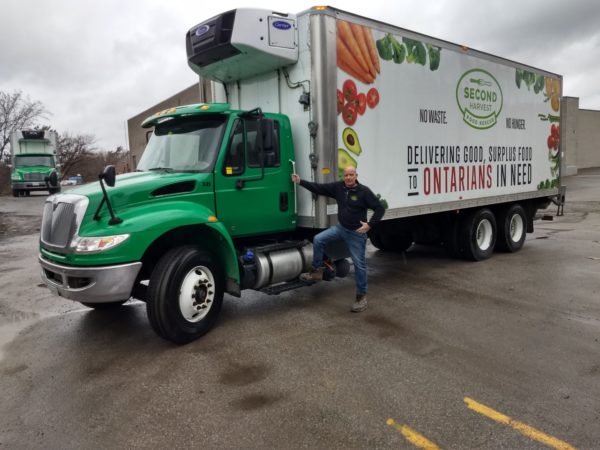Second Harvest keeps donated food on the move
TORONTO, Ont. – Ian MacLeod has just unloaded two tractor-trailers laden with produce, and none of it is destined for a grocery store. But it will all fill a vital need in the fight against Covid-19.
Toronto-based Second Harvest – an emergency service that distributes meat, dairy and produce to charitable organizations – has recently seen a surge in donated food. Much of it would otherwise have been destined for restaurant tables, before the restaurants closed their doors. That’s on top of the usual goods picked up by the skid load, piled with products that are rejected by receivers but still perfectly safe to consume.
“It’s incredible,” says MacLeod, the organization’s fleet and warehouse supervisor. “There’s a lot of people stepping up … As fast as it comes in, it goes out. It’s almost cross-docking.”

“There’s a lot of people in need. We all saw the surge in the grocery stores three weeks ago, due to the panic buying,” he adds, referring to retail shelves that were stripped bare of many products. “A lot of people we serve, they don’t have money to buy one week’s groceries, let alone three weeks worth of groceries.”
Second Harvest typically distributes about 1.5 million pounds of donations a month, coordinated by a 13-member crew that includes eight drivers. The final reports are not yet complete, but MacLeod believes the March totals will double those volumes.
It’s all keeping most of the fleet’s 11 trucks on the move across Ontario, supporting destinations including shelters, food banks, faith-based organizations, and other programs.
The destinations have been evolving more quickly than usual, though. Some operations, based in public spaces like community centers, have been forced to shut down. Almost one-third of the 300 agencies that traditionally receive the food have had to close their doors. But new locations are quickly emerging to fill the gaps, in spaces known to be clean and safe. On Manitoulin Island, this includes a local curling rink that has been transformed into a giant cooler.
Second Harvest is also participating in a national task force including food suppliers such as Loblaw, Sysco and Walmart, as well as charities such as Food Banks Canada and Breakfast Clubs of Canada, looking to ensure such food supplies continue to move. And there’s an ongoing search for offsite cold storage that could be needed to stage deliveries and “slow release” the donations if food becomes harder to access.
There have been changes in the way the work is completed, too.
Second Harvest has actually had Covid-19 protocols in place for about a month, taking steps to protect its drivers and charities alike. The drivers now place selected food donations at the edge of the truck and stand two meters away. Agency personnel unload the goods from there. Hand sanitizer, disinfectant wipes and tissues are used before and after each delivery.
Drivers have traditionally been accompanied by volunteers, but for now they travel on their own. The limited contact helps to promote social distancing for everyone involved.
“Most of the places we’re going to, we’re not even allowed in the warehouses,” MacLeod says.
Having worked in trucking for decades, he has noticed one other change when it comes to the way trucks and drivers are viewed in the midst of the pandemic.
“People are starting to realize that if you buy it in the store, it’s been on a truck,” he says. “I think a lot of people have been removed from that.”
Have your say
This is a moderated forum. Comments will no longer be published unless they are accompanied by a first and last name and a verifiable email address. (Today's Trucking will not publish or share the email address.) Profane language and content deemed to be libelous, racist, or threatening in nature will not be published under any circumstances.